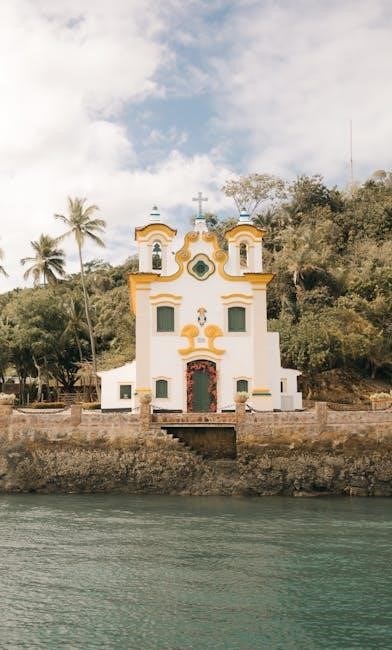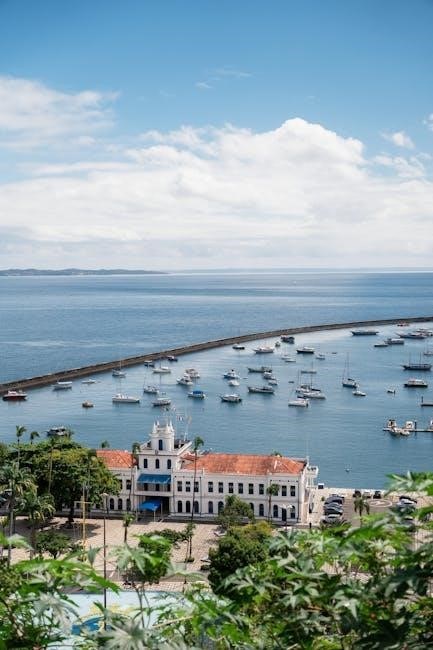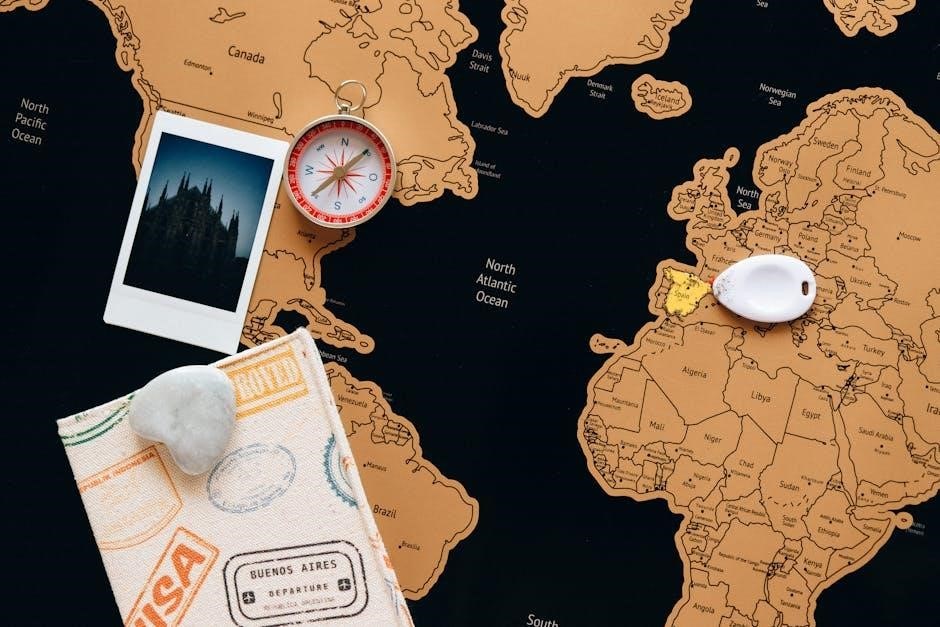Discover El Salvador, a land blending rich culture, breathtaking landscapes, and vibrant history․ From stunning beaches to volcanic peaks, this Central American gem offers diverse experiences․ Recent safety improvements make it an exciting destination for travelers seeking adventure, cultural immersion, and warm hospitality․

1;1 Discovering El Salvador: A Blend of Culture, Nature, and History
El Salvador captivates travelers with its vibrant culture, stunning natural beauty, and rich history․ From colonial towns to ancient Mayan ruins, the country offers a glimpse into its storied past․ Volcanoes, lush forests, and pristine beaches showcase its diverse landscapes․ Immerse yourself in the local traditions, festivals, and culinary delights, blending seamlessly with its adventurous spirit and warm hospitality, making it a gem for explorers and culture enthusiasts alike․
1․2 Why Visit El Salvador? Unique Attractions and Experiences
El Salvador offers a unique blend of adventure, culture, and natural beauty, making it a must-visit destination․ Explore stunning beaches, majestic volcanoes, and lush forests, while experiencing vibrant festivals and rich history․ Surf the Pacific waves, hike volcanic peaks, or discover ancient ruins․ The country’s compact size allows easy exploration, and its warm hospitality, coupled with improving safety and affordability, makes it an ideal destination for travelers seeking unforgettable experiences․

Best Time to Visit El Salvador
The best time to visit El Salvador is during the dry season, from November to April, offering pleasant weather and ideal conditions for exploration and outdoor activities․
2․1 Understanding the Dry and Rainy Seasons
El Salvador’s climate features two distinct seasons: the dry season (November to April) and the rainy season (May to October)․ The dry season offers sunny days, ideal for outdoor activities like hiking and surfing, while the rainy season brings lush landscapes but may disrupt travel plans․ Understanding these seasons helps travelers plan accordingly for an optimal experience․
2․2 Weather Conditions for Outdoor Activities
The dry season (November to April) is ideal for outdoor activities like surfing, hiking, and exploring volcanic landscapes, with sunny skies and mild temperatures․ The rainy season (May to October) brings lush scenery but may disrupt plans due to occasional heavy rains and mudslides․ Travelers should plan accordingly, packing waterproof gear for rainy days and staying informed about weather forecasts to maximize their outdoor experiences․
Must-Visit Places in El Salvador
Explore El Salvador’s stunning natural beauty and rich cultural heritage․ Visit iconic sites like Joya de Cerén, Ruta de las Flores, and the pristine beaches of El Tunco․
3․1 Exploring the Country’s Natural Beauty: Beaches, Volcanoes, and Forests
El Salvador boasts stunning natural landscapes, from the sun-kissed beaches of El Tunco and El Zonte to the majestic volcanoes like Santa Ana and Izalco․ The lush forests of Montecristo Cloud Forest and the scenic Ruta de las Flores offer breathtaking hikes and wildlife spotting․ Cerro Verde National Park, with its dormant volcanoes, provides panoramic views․ These destinations showcase El Salvador’s diverse ecosystems and natural allure․
3․2 Historical and Cultural Landmarks: Ruins, Museums, and Colonial Towns
El Salvador’s historical and cultural landmarks offer a glimpse into its rich past․ Joya de Cerén, the ‘Pompeii of the Americas,’ is a remarkably preserved ancient Mayan village․ The National Museum of Anthropology in San Salvador showcases artifacts and history․ Colonial towns like Suchitoto, with its cobblestone streets and colorful architecture, highlight the country’s Spanish heritage․ These sites blend indigenous and colonial influences, making them essential cultural experiences․
Things to Do in El Salvador
Explore El Salvador’s vibrant culture, adventure, and nature․ Surf tropical waves, hike volcanic landscapes, or immerse in local festivals and markets, blending outdoor thrills with cultural experiences․
4․1 Adventure and Outdoor Activities: Surfing, Hiking, and Volcano Tours
El Salvador offers thrilling outdoor adventures․ Surf the Pacific waves at El Tunco, hike through lush forests, or explore volcanic landscapes like Santa Ana and Izalco․ Guided volcano tours provide breathtaking views and unique experiences․ Adventure seekers can also discover hidden waterfalls and natural hot springs, making El Salvador a paradise for nature lovers and adrenaline enthusiasts․ Safety-focused tours ensure memorable explorations․
4․2 Immersing in Local Culture: Festivals, Markets, and Traditions
El Salvador’s vibrant culture comes alive through its festivals, markets, and traditions․ Attend colorful Fiestas Patronales, showcasing music, dance, and local cuisine․ Explore bustling markets like Mercado Central in San Salvador, where artisans sell handmade crafts and fresh produce․ Engage with welcoming locals to learn about customs and traditions, creating unforgettable memories of Salvadoran hospitality and heritage;
Safety Tips for Travelers
Exercise caution in El Salvador due to risks like gang activity․ Avoid risky areas, use trusted transportation, and stay informed about local conditions for a safer trip․
5․1 Understanding Safety Concerns and Precautions
El Salvador has seen a decrease in violent crime in recent years, but precautions remain essential․ Gang activity, though reduced, still poses risks․ Travelers should avoid high-risk zones, particularly at night, and use reputable transportation services․ Staying informed about local conditions and heeding advice from authorities or guides can significantly enhance safety․ Awareness and cautious planning are key to a secure journey․
5․2 Avoiding Scams and Staying Secure
While El Salvador has improved safety, remain vigilant to avoid scams․ Be cautious in crowded areas and public transport, as petty theft can occur․ Use authorized guides and services for tours and transportation to minimize risks․ Avoid displaying valuables and ensure secure accommodations․ Keeping emergency contacts handy and staying informed about local conditions can help prevent issues․ Awareness and proactive measures ensure a secure and enjoyable trip․

Where to Stay in El Salvador
El Salvador offers diverse accommodations, from budget-friendly guesthouses to luxury resorts․ Coastal towns and vibrant cities provide options for every traveler, ensuring comfort and accessibility․
6․1 Budget-Friendly Accommodation Options
El Salvador offers a variety of affordable accommodations, including hostels, guesthouses, and eco-lodges․ These options cater to backpackers and budget-conscious travelers, providing basic comforts at reasonable prices․ Many are located in vibrant cities like San Salvador or coastal towns, offering easy access to attractions․ Shared rooms, private bathrooms, and free Wi-Fi are common amenities․ These budget-friendly stays are perfect for exploring the country’s beaches, volcanoes, and cultural sites without breaking the bank․
6․2 Luxury and Mid-Range Hotels: Best Locations and Amenities
El Salvador’s luxury and mid-range hotels offer exceptional comfort and convenience․ Many are located in prime spots like beachfronts, city centers, or nature reserves․ Amenities often include pools, spas, and fine dining restaurants․ These hotels cater to travelers seeking relaxation and style, with services like concierge assistance and tour bookings․ They provide an ideal blend of comfort and accessibility, making them perfect for exploring the country’s diverse attractions․

El Salvador’s Culinary Delights
El Salvador’s cuisine is a vibrant blend of indigenous and Spanish influences․ Popular dishes like pupusas and empanadas highlight the country’s rich gastronomic heritage, offering a flavorful cultural experience․
7․1 Traditional Salvadoran Dishes and Local Cuisine
El Salvador’s traditional cuisine is a vibrant fusion of indigenous and Spanish flavors․ Pupusas, thick cornmeal flatbreads stuffed with cheese, beans, and pork, are a national favorite․ Other staples include empanadas, tamales, and yuca dishes․ Fresh seafood along the coast and hearty soups like sopa de pescado showcase the country’s diverse culinary offerings, reflecting its cultural richness and geographical variety․

7․2 Best Restaurants and Dining Experiences
El Salvador offers a mix of traditional and modern dining experiences․ In San Salvador, restaurants like La Pampa Argentina serve mouthwatering steaks, while beachside eateries in El Tunco offer fresh seafood․ For authentic pupusas, head to local eateries in towns like Ataco․ The country also boasts farm-to-table experiences and international cuisine, catering to diverse tastes and preferences, making dining in El Salvador a delightful adventure․
Transportation in El Salvador
El Salvador offers various transportation options, including public buses, private drivers, and car rentals․ Public transport is affordable and widespread, while renting a car provides flexibility for exploration․
8․1 Getting Around: Public Transport, Rentals, and Private Tours
El Salvador offers diverse transportation options for travelers․ Public buses are affordable and cover extensive routes, making them a popular choice․ For comfort, private drivers and car rentals provide flexibility, especially for exploring remote areas․ Private tours, led by professional guides, ensure a tailored and secure experience․ With improved safety conditions, navigating the country has become easier and more accessible for visitors․
8․2 Tips for Navigating the Country Efficiently
Plan your routes in advance and use GPS for accuracy․ Hiring reputable private drivers or joining guided tours ensures safety and efficiency․ Public buses are cost-effective but may require basic Spanish․ Stay informed about local conditions and avoid traveling at night․ Combining transportation modes can optimize your itinerary․ Always carry a map or digital navigation tools to explore confidently and efficiently during your El Salvador journey․
Cultural Experiences and Local Customs
El Salvador offers vibrant festivals, traditional markets, and warm hospitality․ Engage with locals by participating in cultural traditions and learning about the mix of indigenous and colonial heritage․
9․1 Understanding Salvadoran Culture and Etiquette
Salvadoran culture is a vibrant blend of indigenous and Spanish influences․ Respect for elders and religious traditions is deeply rooted․ Greetings are warm, with handshakes common․ Dining etiquette includes waiting to be invited to eat․ Modest dress is appreciated, especially in rural areas․ Understanding these customs enhances your cultural immersion and fosters positive interactions with locals․
9․2 Engaging with Local Communities and Traditions
Engage with Salvadoran communities by participating in local festivals, markets, and traditions․ Attend vibrant fairs celebrating patron saints, featuring music, dance, and traditional foods․ Visit artisan markets to support local crafts․ Homestays offer authentic cultural experiences, fostering connections with families․ Respectful participation enriches your journey, allowing you to genuinely experience the warmth and resilience of Salvadoran culture firsthand․

Final Travel Tips and Planning Essentials
Plan meticulously, budget wisely, and pack essentials․ Stay informed about local conditions and respect cultural norms․ Ensure all travel documents are up-to-date for a seamless experience․
10․1 Budgeting and Cost Management
Budgeting is key to a smooth trip․ El Salvador offers affordable options for accommodation, dining, and activities․ Plan for daily expenses, considering meals, transport, and entry fees․ Opt for local eateries and public transport to save․ Carry local currency for small purchases․ Allocate extra for unexpected costs․ With careful planning, you can enjoy a memorable trip without overspending․
10․2 Essential Packing List and Travel Documents

Pack lightweight clothing, swimwear, and rain gear for El Salvador’s climate․ Include sturdy hiking boots, sunscreen, and insect repellent․ Bring a reusable water bottle and travel documents like passport, visa, and insurance․ Carry a basic Spanish phrasebook for communication․ Ensure all electronics are compatible with local outlets․ Organize essentials like medications and emergency contacts․ Check entry requirements beforehand to avoid delays․ A well-prepared bag ensures a hassle-free adventure․

